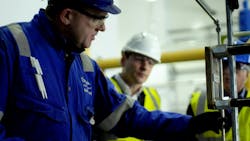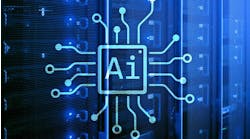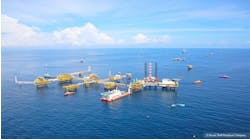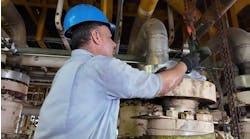Regular fluid systems audits can help prevent rig downtime
Mark Garvey, Swagelok Scotland
Offshore hydrocarbon platforms face significant fluid system challenges that do not occur on dry land. A given system not only needs to withstand the use/abuse that it is likely to see in a rugged industrial setting, but it also needs to withstand the elements offshore. And materials must be selected not just for the process application, but also to survive in the marine environment. If a fitting, valve, or regulator breaks, getting a replacement can be a challenge due to the remoteness of the location. Therefore, specifying components that have a reputation for quality is imperative. Likewise, specifying common components that can be used across multiple systems is advantageous as it limits the number of different spare parts that need to be kept on hand.
To stay ahead of any problems in these harsh surroundings, owner-operators should conduct regular audits of these systems on their rig equipment. The sooner technicians discover failing valves, substandard fluid system connections, or mismatched specifications, the sooner the team can address them and avoid costly and potentially dangerous risks.
Examining fluid system components can detect underlying problems early, as well as help determine how the rig is operating overall. To obtain an objective view, owner-operators may consider calling in a third party—for example, a trusted fluid system component supplier—to provide added expertise.
Offshore rigs, in particular, benefit from in-depth analysis for three basic reasons, discussed below.
Isolation can breed complacency
Working on an offshore hydrocarbon platform can be a lonely experience. Common issues onshore that may warrant input from multiple experts present different challenges offshore where these specialists may not be available. In this situation, being self-reliant is critical. Avoiding incidents by specifying that quality components are used in fluid systems will minimize maintenance and replacement. A thorough audit with a reliable supplier may offer beneficial external input on component selection in a specific application.
In addition, isolated crews, especially those who have the most experience, may be more likely to develop poor installation and operational habits because of their siloed culture and processes. An operational audit can help identify these habits and define areas where education on safer or more effective alternatives is needed.
Offshore operators know they have to be largely self-reliant because of the difficulties in servicing offshore equipment. Working with suppliers who have experience in these environments and understand the specific human and technical challenges rig teams face helps ensure reliable components are selected to enhance overall operational efficiency.
A final complacency danger to consider is that offshore rig operators may have difficulty spotting certain issues due to being isolated for an extended period. For example, they may dismiss the smell of gas as a normal condition when in reality it could indicate a serious leak. Comprehensive audits can identify problems and alert the crew to any necessary maintenance to keep the rig as safe as possible.
Leaks may go unnoticed
Most industrial fluid systems contain leaks, some of which are benign, such as compressed air or nonhazardous gases. While these are typically low-impact disruptions, they can still cost operators significantly if neglected.
In contrast, systems transporting sour or otherwise hazardous gases—which are frequently encountered in offshore operations—could develop leaks that result in serious consequences if unaddressed. The small-bore tubing systems common on offshore platforms present opportunities for dangerous leaks to develop. Whether these leaks are the result of under-tightened connections, mismatched components, or poor installation, the threat to rig workers remains significant and serious. That is why up-to-date and continuous training is crucial in offshore applications.
One benefit of third-party auditors is that they may have access to state-of-the-art technical equipment that may not be readily available in an isolated rig situation. Having someone visit the rig whose sole job is to find and identify leaks or performance issues can provide operators with a full picture of what is happening on the rig. Taking the responsibility for these issues from already overworked rig crews allows them to focus on their primary responsibilities and improve their overall performance.
Changing specifications
Initial engineering specifications for fluid systems designed for offshore rigs will likely call for small-bore tubing and associated tube fittings from the same supplier. Intermixing components from different manufacturers can lead to poor performance, so system designers generally recommend against this practice. However, as time goes on, the component specification may evolve, particularly if new equipment from a different manufacturer is installed as equipment needs to be replaced.
In addition to disrupting performance, intermixing component brands may add unnecessary complexity to inventory and ordering. An audit can identify these issues to ensure consistent availability of properly sourced parts, prevent intermixing, and streamline operations.
Once a comprehensive audit of fluid systems is complete and any issues on the rig have been identified, owner-operators can take actionable steps to correct any problems. Reliable suppliers conducting audits should offer evaluations and advisory services to help keep offshore rigs operating at peak performance to remain safe, efficient, and profitable.




